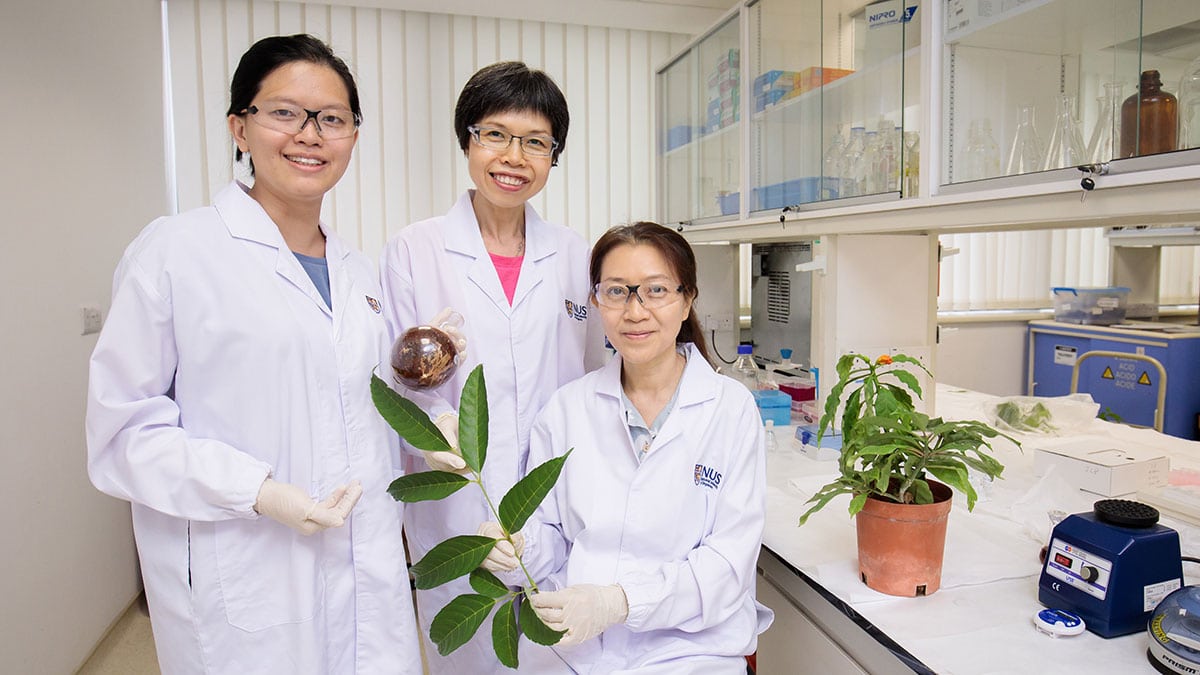 Dr. Siew Yin Yin (L), Dr. Neo Soek Ying (M), Prof. Koh Hwee Ling (R), analyzing the medical property of ASEAN plants (Image via: Tech Explorist)
Dr. Siew Yin Yin (L), Dr. Neo Soek Ying (M), Prof. Koh Hwee Ling (R), analyzing the medical property of ASEAN plants (Image via: Tech Explorist)
Cancer Remedy from ASEAN
SINGAPORE - For those of you who still believe in ancient medicine, there is a good news. A 3 years research done by a team of scientists from the National University of Singapore (NUS) in Singapore showed that some plants of ASEAN ethnicity are effective to treat cancers. These plants are Bandicoot Berry, South African Leaf, and Simpleleaf Chastetree.
The faculty of science conducted research led by Associate Professor Koh Hwee Ling. Ling stated that these 3 plants had been used since ancient times as medicine. However, since then, the plants are now acknowledged to treat cancer as well, a function that was unknown then. Later on, the result of the research was included in the Journal of Ethnopharmacology in 2014.
Using plants as medicine sounds ancient and archaic. Since now there is medicine and antibiotics and science that overcome the past, unknown medicinal knowledge. The research took place in Singapore, and there was an urge to record of how the people of Singaporean and Malaysian - who was residing on that land - used these plants to treat their disease. Not only as a treatment of disease, but these plants were known to amplify the immune system and detoxification.
Originally, the team analyzed 7 plants: Bandicoot Berry, South African Leaf, Simpleleaf Chastetree, Saban Snake Grass, Seven Star Needle, Fool’s Curry Leaf, and Black Face General. The scientists then found out that the first three plants are effective against 7 types of cancers. Seve Star Needle is effective against 5, while Black Face General and Fool’s Curry Leaf are effective to break the cancer cell lines.
More research regarding the anti-cancer properties within the 6 plants are required, and the study suggested that the usage of these plants must not be reckless, as it must be used under special supervision.
Source: https://www.techexplorist.com/six-plants-native-southeast-asia-promising-cancer-warriors/23122/
 English
English Japan
Japan

zithromax birth control buy azithromycin from mexico what is azithromycin good for what not to eat while taking azithromycin
azithromycin copd exacerbation zithromax 50mg can you buy azithromycin over the counter how long azithromycin take to cure chlamydia
cost of cialis vs viagra viagra for men pfizer for professionals viagra prior authorization buy viagra online blue pill pfizer vgr 50 ed cures for men over 60 viagra side effects viagra warning label brand name cialis 20mg free stuff for health fairs hims viagra cialis when to take natural pde5 inhibitors supplement how to take viagra for maximum effect nitroglycerin and viagra interaction over the counter viagra grease makeup vs cream makeup cialis vs flomax for bph taking 2 viagra at once viagra alternative chinese male enhancement supplements lowest price viagra pills viagra boys generic cialis 60 mg india viagra 100 mg best price recently fda approved cancer drug roman viagra sildenafil uses in women
provigil mexico farmacia modafinil over the counter teva provigil/200 mg where can i buy provigil over the counter
plaquenil prescription can you combine doxycycline hyclate with plaquenil how much plaquenil does it take to overdose
doxycycline vs azithromycin can you drink alcohol while taking azithromycin what are the serious side effects of azithromycin?
buying priligy dapoxetine 30mg price dapoxetine uses and side effects how long to geel side effects of dapoxetine
dapoxetine hydrochloride uses dapoxetine online buy priligy es de venta libre en argentina stendra and priligy pill for ed how effective is it
plaquenil) hydroxychloroquine 90mg what testing are required for plaquenil what does the plaquenil test consist of
on an empty stomach definition cialis overnight fedex cost of viagra per pill cvs photo book blue pill with 100 buy painkillers online overnight
amoxil amoxicilli amoxicillin 50 mg tablets amoxil syrup for babies cvs amoxicillin clarithromycin lansoprazole
plaquenil drug hydroxychloroquine 200 mg tablet icd 10 plaquenil eye exam how does plaquenil work for sle
miralax samples for healthcare professionals erectile dysfunction exercises generic viagra available in usa viagra kaufen statins and viagra interaction is viagra good for you
ivermectin wormer how to buy stromectol ivermectin for humans covid 19 what percentage of ivermectin is 5 mg per ml
cialis black vs cialis cialis 10mg vs 20mg pictures with pink viagra naturel the little red pill for men viagra 100 mg best price